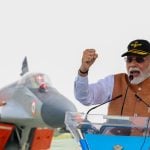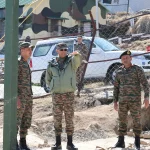In the wake of the Indian Air Force’s precision airstrikes on May 10, 2025, that severely crippled multiple Pakistani military airbases, Pakistan has moved to reactivate emergency airstrips located on its national highways. Sources confirm that the Pakistan Air Force (PAF) will conduct revalidation exercises for the M1 and M2 emergency airstrips, situated along the Islamabad-Peshawar and Islamabad-Lahore motorways, later this week. These efforts aim to ensure the country’s preparedness for a potential aerial response after extensive damage to its primary military infrastructure.
The Indian airstrikes, part of Operation Sindoor, targeted key military sites across Pakistan, hitting 11 strategic airbases, including Rafiqui, Murid, Nur Khan, Rahim Yar Khan, Sukkur, Chunian, Pasrur and Arifwala. Satellite imagery revealed extensive damage, including cratered runways, collapsed hangars, and destroyed air defense radars, particularly at Rahim Yar Khan, where a massive crater disrupted the main airstrip. Other sites, including Pasrur, Chunian, and Arifwala, also saw heavy damage to critical radar systems.
Also Read: India Becomes The First Country to Strike 11 Air Bases of a Nuclear Powered Country
One of the most significant targets was the Nur Khan airbase in Chaklala, home to Pakistan’s vital transport squadrons, including C-130 Hercules and IL-78 mid-air refuelers. Its proximity to Islamabad’s Strategic Plans Division, which manages the nation’s nuclear arsenal, heightened concerns following the strike. Despite these fears, Indian Air Marshal AK Bharti later clarified that there were no strikes on nuclear assets in the region.
The Indian airstrikes left more than eight Pakistani airbases incapacitated, sparking widespread panic within Pakistan’s defense establishment. In response, Pakistan is turning to its contingency plans by reactivating the M1 and M2 emergency airstrips, designed for use in times of crises. However, these highways were not spared during the attacks, with significant damage to key motorways.
The strikes have sent shockwaves through Pakistan’s leadership, with Prime Minister Shehbaz Sharif reportedly convening a meeting of the National Command Authority—the country’s top nuclear decision-making body—on the same day, though Islamabad later denied such claims. Indian officials, on the other hand, have emphasized that these strikes were a clear signal of India’s operational readiness and its commitment to safeguarding its sovereignty.
As Pakistan scrambles to restore its air capabilities through emergency infrastructure, the regional security landscape remains tense, with both nations on high alert.













